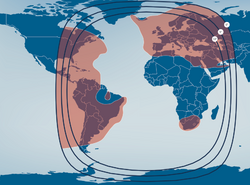Engineering:Telstar 12
| Names | Orion 2 (1999) Telstar 12 (2000—) |
|---|---|
| Mission type | Communications |
| Operator | Loral Skynet[1] (1999-07) Telesat (2007—) |
| COSPAR ID | 1999-059A |
| SATCAT no. | 25949 |
| Mission duration | 15 years |
| Spacecraft properties | |
| Bus | LS-1300E |
| Manufacturer | Space Systems/Loral |
| Launch mass | 3,814 kilograms (8,408 lb) |
| Power | 10.6 kilowatts |
| Start of mission | |
| Launch date | 19 October 1999, 06:22 UTC |
| Rocket | Ariane 44LP H10-3 |
| Launch site | Kourou ELA-2 |
| Contractor | Arianespace |
| Orbital parameters | |
| Reference system | Geocentric |
| Regime | Geostationary |
| Longitude | 15° west |
| Perigee altitude | 35,780 kilometres (22,230 mi) |
| Apogee altitude | 35,805 kilometres (22,248 mi) |
| Inclination | 0.01 degrees |
| Period | 23.93 hours |
| Epoch | 29 October 2013, 07:55:57 UTC[2] |
| Transponders | |
| Band | 38 Ku-band |
| Frequency | Uplink: 13.75-14.5 gigahertz Downlink: 10.95-12.75 gigahertz |
| Bandwidth | 54 megahertz |
| Coverage area | North America Caribbean South America Europe Middle East South Africa [3][4] |
Telstar 12, previously known as Orion 2, is a Canadian communications satellite in the Telstar series which is operated by Telesat. It was originally built for Orion Network Systems, which merged with Loral Skynet shortly before the satellite was launched. It was subsequently transferred to Telesat when it merged with Loral Skynet in 2007.
Telstar 12 is a Ku band satellite with coverage of North America as far west as Cleveland, Ohio, the majority of South America and Europe. Telstar 12 also has the capability to provide intercontinental connectivity including trans-Atlantic to the Mid-East.[3] Eutelsat uses four transponders on the satellite for services between Europe and the Americas.[5]
On 1Q 2016, Telstar 12 was replaced in its orbital position with Telstar 12 Vantage satellite.
See also
- Telstar
- Telesat
References
- ↑ "Telstar Fleet". Loral Skynet. Archived from the original on 9 February 2012. https://web.archive.org/web/20120209075648/http://www.loralskynet.com/template.asp?p=sf_telstar&m=m_sf&sm=.
- ↑ "TELSTAR 12 (ORION 2) Satellite details 1999-059A NORAD 25949". N2YO. 29 October 2013. http://www.n2yo.com/satellite/?s=25949. Retrieved 29 October 2013.
- ↑ 3.0 3.1 "Telstar 12 15° W". Loral Skynet. Archived from the original on 9 February 2012. https://web.archive.org/web/20120209075653/http://www.loralskynet.com/pdf/telstar12_pamphlet.pdf.
- ↑ "Telstar 12 Downlink Coverage". Eutelsat. Archived from the original on 5 October 2013. https://web.archive.org/web/20131005001353/http://www.eutelsat.com/en/satellites/the-fleet/TELSTAR-12-downlink-coverage.html. Retrieved 4 October 2013.
- ↑ www.eutelsat.org "TELSTAR 12 :: 15° West"
External links
- International Media Switzerland – official provider's site
- Telesat's press release of T12V availability
 |


